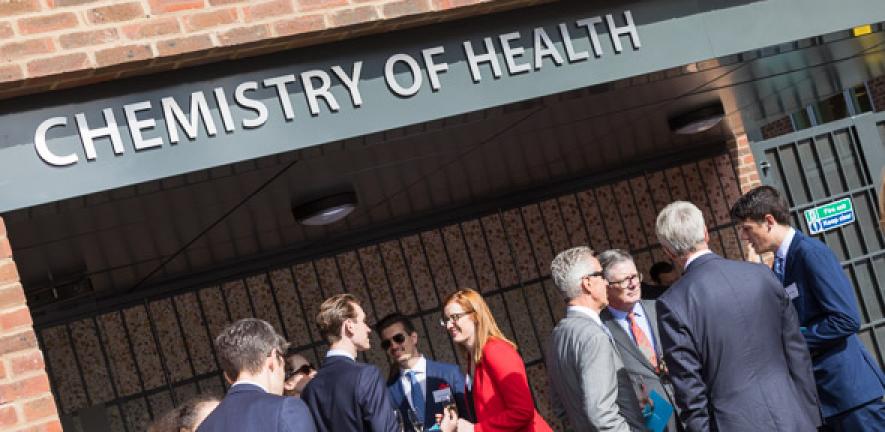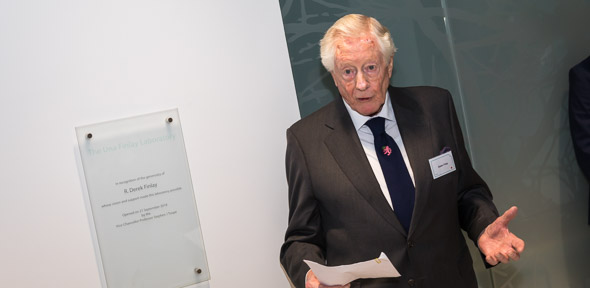
The building houses the Centre for Misfolding Diseases, a world-leading research facility focused on the misfolding of proteins in human cells – a phenomenon that causes a number of disorders including Alzheimer’s, Parkinson’s, Huntington’s and motor neurone diseases.
The building has been funded by £17.6 million from Research England’s UK Research Partnership Investment Fund (UKRPIF), as well as with contributions from Elan Pharmaceuticals and AstraZeneca.
"The research carried out here has the potential to affect millions of lives around the world for the better."
Among the philanthropic contributions to the project is a £5 million donation from Cambridge alumnus Derek Finlay (pictured here). It was given in memory of his wife, Una, who died in May 2016 after a long struggle with Alzheimer’s disease.
The main laboratory in the new building has been named after her. Derek and his family – many of who were present at the opening – hope that the discoveries made here will help transform the lives of those suffering, now and in the future, from neurodegenerative disorders.

As the plaque outside the Una Finlay Laboratory was unveiled, he said: "This is a special and very poignant day for myself and my family. This building will enable world-class research that will speed up the search for ways to delay, ameliorate and ultimately abolish these dreadful neurodegenerative diseases."
A 2015 report suggested that by 2030, there will be 75 million people worldwide living with Alzheimer’s disease. While the number of cases of Alzheimer’s diseases and other neurodegenerative disorders continues to rise, so too do the costs to society, both economic and emotional.
Performing the opening ceremony, Vice-Chancellor Professor Stephen J Toope said: "Our scientists and this building offer hope. The research carried out here has the potential to affect millions of lives around the world for the better. Through collaboration and the sharing of ideas, our research teams will work to find the keys that unlock the mysteries of neurodegenerative disorders, one of the greatest health problems of our age."
The Centre for Misfolding Diseases is co-directed by Professor Sir Christopher Dobson, Professor Tuomas Knowles and Professor Michele Vendruscolo, three world leaders in their fields who have been studying the molecular origins of neurodegenerative diseases.
"This building will for the first time bring together a large number of scientists from different disciplines who are dedicated to establishing the molecular basis of neurodegenerative disorders and to identifying new ways for treating or preventing these debilitating conditions," said Dobson.
"The treatment of neurodegenerative disorders represents a major challenge, requiring both the development of innovative biophysical approaches and their translation into diagnostic and therapeutic tools," said Vendruscolo. "With this new building, we have created favourable conditions to combine these two steps."
"This facility will be a crucial element in helping us to tackle the challenge of understanding the molecular mechanisms of dementia and developing effective ways to counteract them," said Knowles.
The new building is also home to a Chemistry of Health Incubator, which will enable closer collaborations between researchers and industry and host spin-out companies in order to increase the rate at which scientific discoveries are translated into new therapies. The new incubator is the first in Cambridge to be directly integrated into a University department, and will provide the resources and complementary know-how required to ensure that fundamental research is ultimately used to develop new treatments for patients. The first spin-out company to move into the Incubator will be Wren Therapeutics, which is based on a ground-breaking drug discovery method for neurodegenerative disorders developed at the Centre for Misfolding Diseases.
The building is also home to the wide array of modern biological and bio-physical facilities housed in the Molecular Production and Characterisation Centre, which will provide services to University and industry users.
Watch the building being constructed in just three minutes.

